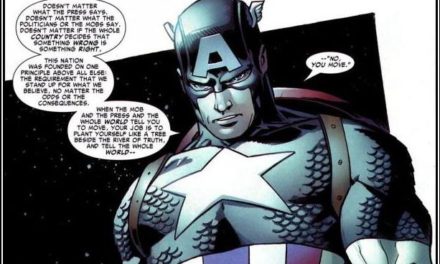I have a bad case of Gilead Anxiety. I worry that America could become like the nation in “The Handmaid’s Tale,” called speculative fiction because it is a look at what things could become.
Despite the marketing materials, the interviews, and the feminist subcultures in which I conduct most of my business and personal life, I’ve heard it said:
You’re overreacting. We’re not heading towards Gilead just yet.
People who have said this include enemies and allies, teachers and friends; even women who marched for civil rights and women’s rights in March of this year – or in decades past.
In an era of fake news and gaslighting, sometimes I have a hard time knowing if my perception of socio-political reality is justified or even real. When experts are pundits and fact may be fiction, it’s often easier to give in to whatever my peer group or loved ones say, or to save that energy to fight a different battle.
My Gilead Anxiety is pervasive, and over the last few months, I’ve been exploring it in research and conversation. I’ve determined that Gilead Anxiety is justifiable, and rooted in historical facts (of how totalitarian regimes come to power combined with current proposed legislation in the United States), but that I also need to broaden my world view to ensure a more intersectional perspective that benefits all women.
Here’s a look at my journey.
What is Gilead?
Gilead is the repressive, religious, patriarchal government that replaces the United States in “The Handmaid’s Tale,” a series currently airing on Hulu. The series is based on a popular book of the same name by Canadian author Margaret Atwood.
On the subject of the Trump administration and whether she is tired of discussing it, Atwood told “Vanity Fair” in April of 2017:
“It’s inexhaustible because we don’t know what his next act is going to be. Or what’s going to happen next.”
In Atwood’s masterful story, society changes from the contemporary to Gilead very quickly. The show portrays this sudden change from multiple angles, suggesting that Serena Joy and her husband Commander Fred Waterford make the conscious decision to cede women’s rights to proceed with this new order.
From protagonist June’s perspective, the sudden occurrence happens while she’s at work. All of the women are fired, and their assets frozen and passed to their male next-of-kin.
While Gilead is a theocratic autocracy, it also represents the swift change of order.
Change some people evidently wanted, as the new government provides solutions to infertility and environmental destruction that voters desperately craved.
Much of this sounds pretty familiar to me.
What is the Strongest Warning Sign of a Totalitarian Regime?
Aside from the obvious red flags we’ve already seen with the Trump Administration, there’s one that hasn’t happened yet on a large scale – but I’m keeping my attention and support on places like Standing Rock (donate here) in this regard.
Atwood says:
“I do believe America is quite an ornery and diverse place, and I don’t think people are going to roll over easily for this, but a totalitarian [government] gets serious the moment at which it fires on a protest crowd.”
With other injustices are highlighted by movements such as #BlackLivesMatter, we live on the precipice of a turning point in the relationship between our government and our citizens. Ieshia Evans’ iconic resistance and arrest did not occur in bloodshed, but she was there to resist police violence and brutality against black citizens.
Imagine if this scene had played out differently. Would we be one step closer to Gilead?
(Trigger warning and editorial note: The below video features brief clips of police officers using force against black men, though the focus of the video is an interview with Ieshia Evans. I have included this video because Evans’ resistance and the officers’ response is relevant to the discussion and it’s important to showcase the participation of women of color in this wider conversation. I selected this particular interview because it was conducted by a woman of color.)
The Art of Trolling: It’s All a Joke
In “The Handmaid’s Tale,” June expresses concern after losing access to her bank account, which contains thousands of dollars. According to the new government, all funds are transferred to her next-of-male-kin, meaning her husband. And feeling helpless in the situation, her husband says not to worry. He will take care of her.
Of course he will. He loves her.
But he doesn’t immediately understand why his reassurance is met with disgust from June and her friend, even though he seems otherwise sensitive to issues.
Just as jokes about consent and ownership play into overall rape culture in a patriarchy, so too does this. What the offender sees as harmless (or even helpful) simply isn’t.
Sometimes we wonder: did privileged Germans realize how horrendously oppressive their government was? After all, the Nazi Party had promised change – and delivered it. And now that executive-appointed officials are hired and fired on a whim in the United States, you could say change is happening here, too.
But how is this connected to the oddball trolling culture that got Trump elected?
Is it a joke or isn’t it? That’s one step away from the next issue.
Gilead Anxiety: A Reflection of Privilege
While it is dismissive when others (particularly men) downplay our anxiety over the state of women’s access to healthcare, potential equal pay, and education, it’s imperative to remember the struggles of women internationally, many of whom live in a reality much closer to Gilead.
Atwood recently retweeted a salon.com piece by Dierdre Corley which warns against losing a wider view of these important issues:
Stop making “The Handmaid’s Tale” about your liberal anxiety https://t.co/YzVISszYXq (Or "only about." )
— Margaret E. Atwood (@MargaretAtwood) May 21, 2017
So while Gilead Anxiety is justifiable, it’s important to remember that the reality of these societies exists elsewhere in the world. This is is a doubly important point of privilege if you’re white, as many women and nonbinary who suffer under religious regimes are also people of color.
Our anxieties are real, but they cannot be veils between us and women who are different from us, whether due to sexual orientation, assignment at birth, skin color, socio-economic status, or geography.
Aside from being harmful to others, this insular thinking only promotes a Trump patriarchy.
What do you think about Gilead versus the current state of American politics? Comment below.




